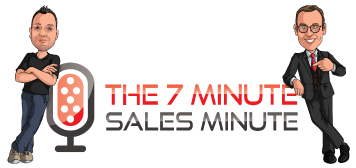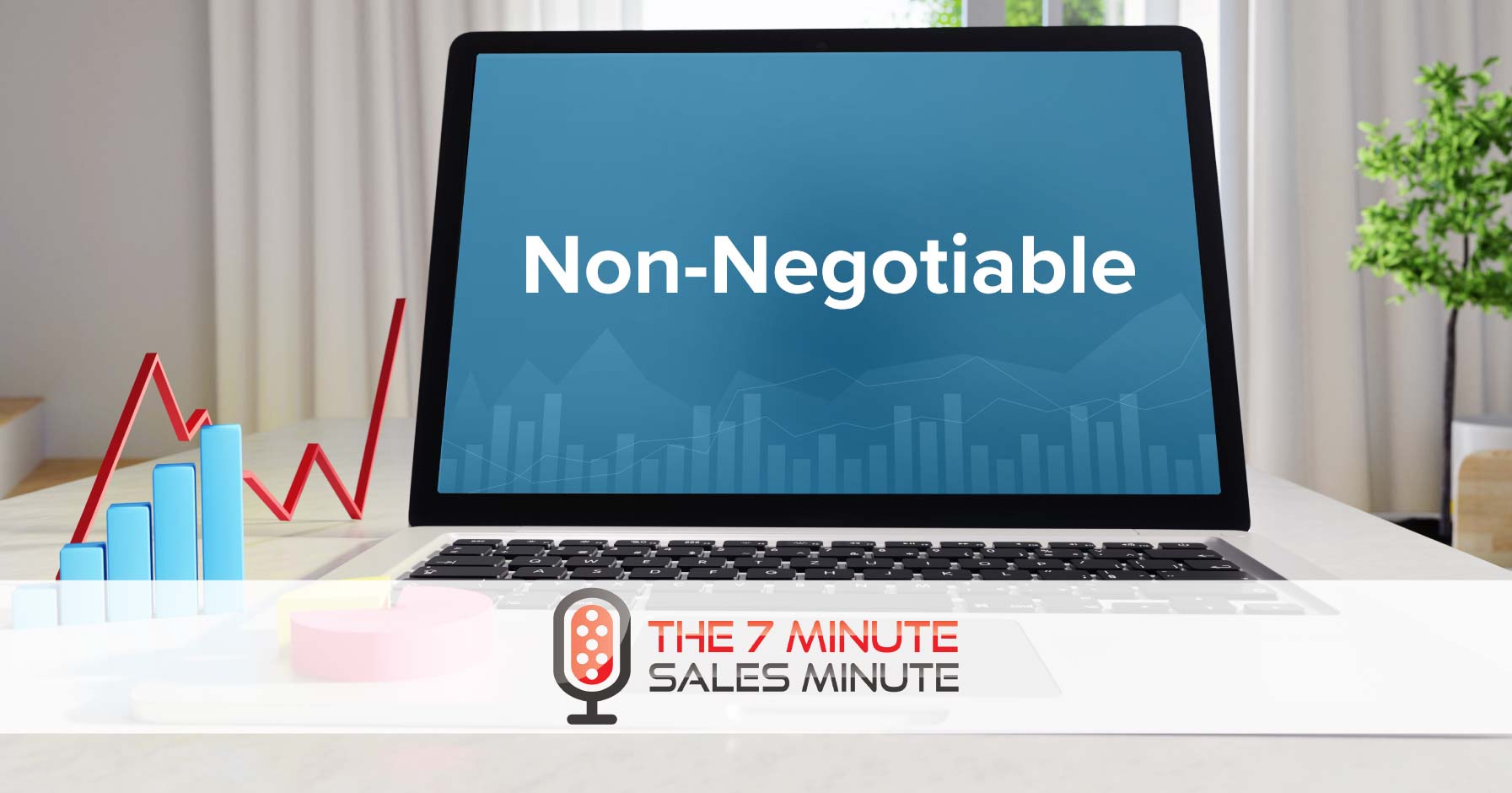
In this episode, the fellas give you steps to spice up your sales pitch.
Flying by the seat of your pants is bush league.
It’s time to properly prepare your presentation.
Read the transcript
Jon: I’m Jon Dwoskin. And this is The Seven Minute Sales Minute.
Scott: Welcome, everybody. Hey, good morning Jon.
Jon: Scott, good morning. How you doing?
Scott: I’m doing great today. How are you?
Jon: Why are you doing so great?
Scott: I don’t know man, this coffee’s delicious. Pumpkin spice in the house. I mean, it’s that time of year.
Jon: Right. I did see at Starbucks the other day when I was there. I’ve never even had one but it said, “I Pumpkin Pumpkin Spice Lattes, so PSL.”
Scott: Oh my gosh.
Jon: It was a pin. I love Pumpkin Spice Lattes. At Starbucks, they’re promoting them pretty hard.
Scott: Let me tell you. Trader Joe’s – I don’t know if you go there ever, but …
Jon: I love Trader Joe’s, yeah.
Scott: They always have their flavor of the month or whatever, and when it’s pumpkin spice, like legit pumpkin spice pumpkin seeds. So good.
Jon: Coffee?
Scott: No. Pumpkin spice, but like …
Jon: Oh, the pumpkins seeds. Oh got you. Okay.
Scott: It’s just pumpkin everything this time of year. In August, it was mango. I forgot what it was in September, but I just, you know, I’ll overdose a little bit for sure.
Jon: All right, well, in the spirit of pumpkins, let’s … Today, thanks everybody for joining and listening. Today we’re going to talk about preparing for the pitch.
Scott: I like it.
Jon: I like to, too. I think, you know, salespeople I think are, you know, they do, they make the call, they get the opportunity, they put together a proposal, they run out, they do the pitch and then when they’re at the pitch I think a majority of salespeople remember and think to themselves, “Fuck! I should have prepared for this pitch.” We’re going to reverse engineer some of the seven steps today on what you should be doing to prepare a little bit more effectively so you can increase your closing rate.
Scott: A lot of times what you’re saying is we fly by the seat of our pants and we just don’t … There is no prep. It’s just like, “Hey, we’ve done this before. We’re just going to wing it because someone else was a similar client or similar customer,” so we’re not actually giving the client their fair share, their full due.
Jon: Exactly. Running, running, running until you just don’t have time. Let’s talk about seven steps …
Scott: All right, cool.
Jon: … for preparing the pitch.
Scott: All right, what’s number 1, Jon?
Jon: Number one is really important and I think most sales people are afraid to ask the following questions. We talked about them a little bit on past podcasts, I think, and these two things you must know when you’re preparing a pitch. You need to know who your competition is and you need to make sure that you’re talking to all the decision makers.
Scott: Right.
Jon: If you don’t know who you’re competing with you cannot pitch the benefits of your services, your unique ability, your company’s unique ability. You are, and if you’re not talking to all the decision makers, you cannot influence that you’re going to close the … you can’t close the sale.
Scott: Right.
Jon: You have to assume that other decision makers are talking to other people and if they have more influence with their partners, you’re spending 10+ hours preparing for the wrong people and you don’t even know who you’re competing with.
Scott: Exactly. And it tells them how serious you are. If you have the gumption to say, “Hey, are the decision makers going to be at this meeting?” If they say no, then we have to make sure they’re there, number one, but it also lets them know that, “Hey, this guy’s time is valuable,” or “This gal’s time is valuable.”
Jon: Absolutely. “Mr. and Mrs. Client, can you tell me who I’m competing with? Mr. and Mrs. Client, besides you, who are the other decision makers and can they be at the meeting?”
Scott: Right. Now, one thing that I notice sometimes – do you ever have people that – they don’t want to tell you who your competition is?
Jon: Yes.
Scott: Cracks me up. Like I love when, if I ask someone, and this is just a side note, but they say, “Oh, someone beat you on price,” and I say, “Okay, cool. Well, before I go just for my notes, who was it you were working with, and they’re .. the answer invariable is, “Well, I’d rather not say that.” It’s like, “Why? What is it? What’s the big deal?” It’s not like I’m going to go blow them up so they can’t do business with you or call and say, “Hey, Jon’s a jerk. Don’t do business with them.” It just cracks me up. Just the human nature of that response.
Jon: Well you know, just, if somebody’s going to say to me, “Such and such beat you on price,” my response is, “Okay, but they’re not going to beat me on value.”
Scott: Right.
Jon: I don’t compete on price, ever. If people understand the value as a salesperson that you’re bringing to the table, then price is not an issue. If it’s an issue, then you either, then as salespeople we didn’t either sell the value properly or we’re talking to the wrong person.
Scott: Right.
Jon: You know, somebody who we don’t want as a client, frankly.
Scott: No, absolutely. That’s kind of the whole thing. No matter what they say they beat you on, and you say, “Who was it?” and they say, “I’m not going to tell you that. It’s a secret.” It’s weird.
Jon: It’s weird. Or maybe they just don’t like you, and everybody’s not going to like you, and I think I’ve lost business … I don’t know, you know, who could not like me, but some people, I guess, have not in the past and, you know, they just don’t use you.
Scott: Jon, a lot of people don’t like me. I’m a polarizing person. All right, number two. Set your date and time of the meeting and make sure you reverse engineer your schedule. What we mean by that is know exactly when your meeting is and plan accordingly as far as, like, when you’re going to make sure you have enough time to make sure that you are fully prepared.
Jon: Right. Let’s talk about the next couple things. So, one is, I agree with you, creating that. Having the mindset to do it and creating a reverse engineer. Then, number three is to put the proper team in place. You want to. Don’t get greedy. I see, and I know you do, too, salespeople all the time get greedy because they see a commission they don’t want to split it. So they don’t put the right team in place, they end up losing the business.
Scott: Right, not to mention it’s the control thing, too. Don’t be a control freak.
Jon: Or they end up getting the business but can’t close the business, so put the right team in place. That’s number 3.
Scott: Yeah, it’s delegate.
Jon: Number 4.
Scott: Well, it falls right into delegate. Define roles and responsibility.
Jon: Critical.
Scott: Like, you are not a jack of all trades. I say, Jack of all trades, master of none, right? Don’t try to do everything yourself.
Jon: Right. Define everybody’s role, define everybody’s responsibility, define what everybody has to do, and going just back to number two as you reverse engineer, set deadlines and time frames for people so they know what they need to do by when, so then everybody can hold everybody accountable.
Scott: Right.
Jon: It’s also a good practice after, when you have that type of meeting, somebody, maybe it’s somebody on the team or somebody’s executive assistant, sends out a recap email outlining everybody’s role, everybody’s responsibility, who’s doing what, the deadline for everything, and the schedule that is in place.
Scott: Right.
Jon: Alright. Let’s talk about number five.
Scott: Next, we’re going to take it seriously. If it’s worth doing, it’s worth doing right, so pre-schedule time to practice and role play.
Jon: I mean, period, the end.
Scott: Well, yeah, but, period the end. Make sure that you’re doing it right. Don’t just role play, don’t just run through a script and say, “Oh great. We did it good.” Prepare for all sorts of contingencies.
Jon: Right, somebody, you need to role play presenting the proposal, you need to role play that somebody is the boss or somebody is the client, you’re the broker. You’ve got to deal with how you’re going to pitch the company, yourself, the benefits, everything.
This gets into number six, which is understand the hot buttons of the prospect and what is your angle. You’ve got to role play all of that. What are the objections? This should be, this step right here, 99.99% of the time, salespeople will not do it. It is the most, in my opinion, critical element of business. Do you want your practice to be when you’re in front of a client? That’s just insane.
Scott: Right. What is your angle? That’s very big, like what’s the WIFM for them? What’s in it for them?
Jon: Right.
Scott: Know why you’re going in there and why they’re even talking to you. You are not a one-size-fits-all product, so whatever you’re selling, have it tailored to them. Let them know exactly why they need it and what the benefits are. Don’t just give them the one-size-fits-all solution.
Jon: Right. Customize it to them.
Scott: Yes, tailor made solutions, Jon.
Jon: 100%. Number 7 is kind of a collection of some of the things we’ve talked about, but important to highlight. Be overly prepared and role play any and all possible objections.
Scott: Yeah, that’s huge.
Jon: Huge.
Scott: If there’s, you know, if you don’t get an objection you’re not making a sale. If you don’t get an objection you’re just an order taker. Our jobs as salespeople begin when that first objection hits, so be prepared for them. When you’re role playing, throw random, weird shit in there, too. It doesn’t need to be just the simple, like, “Well, your price it too high. Well, so and so has a better service plan,” or, “You know, I don’t like the color,” or “I’ve got to talk to my spouse.” Prepare for weird ones, like what if I have diarrhea? Things like that. Just random weird ones because that way you’re going to be prepared for any and all contingencies, you’re going to be ready to rock, and you’re not going to be thrown off your game with just the most weird objections, because we’ve all had them, and in my line of business we get things like, “I need to pray on it. I need to talk to my financial planner. I need to talk to my barber. I need to talk to this person.” There’s so many things that I hear on a daily basis. I’m never surprised when I hear a random objection.
Jon: You’re probably practicing some of those so you have certain things in your tool box that you can answer those as far as questions for them to ask their accountant or, “Hey, why don’t we get your accountant on the phone right now so I can help answer those?” Whatever it is, you’re ready to prepare and take action.
Scott: Exactly, because if you go with just your knee-jerk reaction to a really weird objection, you might laugh at them, you might belittle them, you might offend them. For one, I used to hear the “I need to pray on it” objection and …
Jon: Hallelujah.
Scott: … One thing I used to say is, “Well, I’m pretty sure you already prayed on it, because I’m here.” That went over a couple times well and couple times it got me hung up on and a couple times I probably could have lost my job for saying that, so I needed to prepare better ways to handle that stuff.
Jon: You know, something to prepare about that. A lot of times we try to address things here that salespeople maybe overlook, but is the conditional close. It’s very challenging to do – it’s uncomfortable to do -but to say to a client, “Hey, if we can address or if we can get over X, Y, or Z, is there any reason you wouldn’t do X with this sale?” That’s a very hard question to ask because it’s just uncomfortable. You’ve got to practice that one because most people will not do it, but it’s a great way to practice it because when you’re pitching it, it gets all the objections really out on the middle of the table at the end of the meeting.
Scott: Exactly. If you do it right they know you’re serious too.
Jon: Correct. Right. But, it allows you to then recap the “Why you?” The why your company, the why you’re the solution, the benefits of you. It allows you to kind of recap, based on what their hot buttons are at the end of the meeting.
Scott: I like it. So that was seven things. I’m going to give you one bonus.
Jon: A bonus?
Scott: Yes!
Jon: Oh my God.
Scott: Number eight, and this is one that, a lot of times, we don’t think about and we should and we’re going through all seven of these things. How about this? Don’t forget to close.
Jon: I love it.
Scott: Just don’t forget.
Jon: Yeah, don’t forget.
Scott: Don’t end the meeting without actually asking for the business.
Jon: Cha-ching. Period. Dot.
Scott: Folks, this has been great. Another seven- minute-ish podcast that we want to say thank you for listening. We know you’ve got a lot of choices out there. The reviews have been great – keep them coming – and, please, have a great day.
Jon: Have a great day, talk to you soon. Thanks everybody for listening. Now, no excuses. It’s time you put everything you listened to into action. Stop bullshitting yourself. Stop lying to yourself. Stop listening and doing nothing with this information. Take this information, implement it into your day, kick some ass, grow your business, grow your sales, make more money, have more fun, have a better life. Period. The end.
Scott: What he said.




